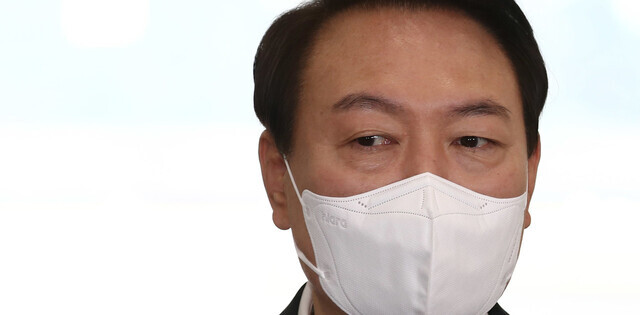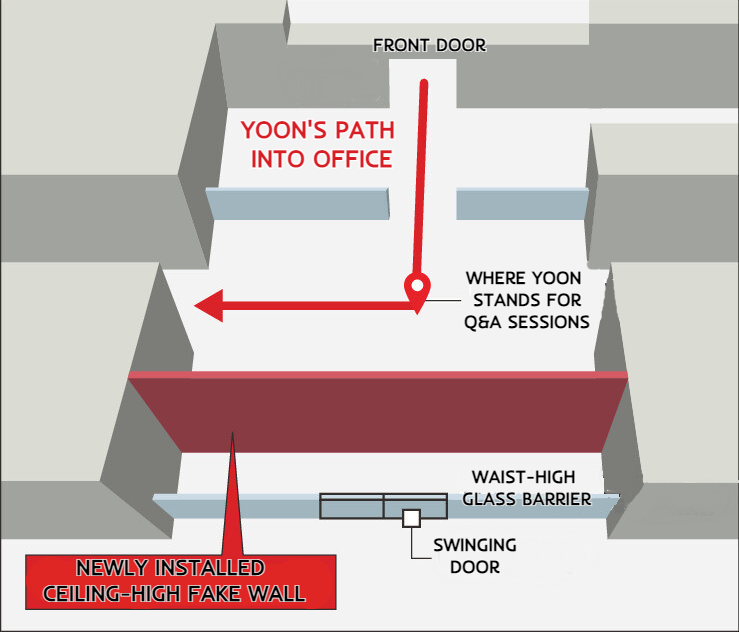hankyoreh
Links to other country sites 다른 나라 사이트 링크
Yoon seeks solution for foot-in-mouth risks by shifting blame to critics

With Korea’s presidential office announcing its decision Monday to stop fielding questions from reporters while heading into the office, a practice long promoted by the administration as a symbol of President Yoon Suk-yeol’s “Yongsan era,” critics allege that its arguments are less than persuasive.
They suggest the administration has abandoned its own justification for the so-called doorstep interviews, highlighted by Yoon during an August press conference to mark his first 100 days in office, when he called the interviews "a process of creating a new presidential culture that shows the president as he is as he receives criticism."
Yoon and the presidential office have repeatedly listed the doorstep interviews as a benefit brought by the decision to relocate the office.
On June 9, the presidential office called the interviews a positive transformation that emerged with the presidential office's relocation from the Blue House to Yongsan, calling Yoon "the first president the people could witness going to work every day, and the first to frequently respond to what the people are wondering about on his way to work."
Asked during a press conference on Aug. 17 to mark his first 100 days in office whether he would continue the doorstep interviews "even though controversies have emerged over [his] responses and attitude," Yoon himself responded that he would, explaining that he believed that "in a liberal democracy, the president must reveal to the people in a transparent manner how he does his job, and accept sharp criticism and various comments from the people."
"Many people have told me to stop the doorstep interviews because they are hurting my approval ratings,” Yoon said, “but the interviews are the most important reason I moved the presidential office to Yongsan."
However, Yoon and the presidential office — a mere five months into the administration’s term — have now announced that they are suspending the doorstep interviews, taking issue with MBC for "maliciously trying to alienate an alliance with fake news" and for "behavior bordering on a riot."
In the process, Yoon called MBC's report about Yoon’s alleged use of an obscenity in New York in September "malicious," while avoiding confirmation of whether he used the obscenity in question.
Suspicion has thus emerged that with concern growing over risks to presidential messaging due to “uncomfortable questions” and Yoon's “pointed responses” during doorstep interviews, the presidential office merely used a report by a particular media company and the resulting friction as an excuse to completely suspend the interviews
A presidential office official told the Hankyoreh that "pressure had grown from Yoon's support base to suspend the doorstep interviews, which presented more disadvantages than benefits,” and that internally, the administration "had been considering how to positively digest [that pressure].”
Daegu Mayor Hong Joon-pyo, who reportedly advises Yoon on state affairs, wrote on Facebook that suspending the doorstep interviews was a “good decision, even if it feels a bit belated.”

The presidential office has come under criticism for being less than forthright, having just a day earlier dismissed construction work to fence off the doorstep interview venue as “unrelated to the doorstep interviews.”
On Sunday, a presidential official said the office was erecting the wall because “some reporters had unilaterally photographed a foreign delegation during a reception,” and that it had “nothing to do with the doorstep interviews.”
However, just a day later, the presidential office announced it would no longer be doing the interviews, denting its own credibility. It attempted to shift responsibility for the suspension onto the media, claiming that although Yoon wanted more than anybody to continue the doorstep interviews, “[the presidential office] felt shameful incidents such as shouting [by some reporters] rendered the original purpose of the interviews difficult to maintain.”
Critics say this matter has revealed Yoon's view of the media, namely his inclination to not take the bitter with the sweet.
After expressing intense displeasure with MBC, Yoon held a private chat with two friendly reporters from CBS and Channel A aboard the presidential plane during his tour of Southeast Asia on Nov. 13.
Won Yong-jin, a professor of communications at Sogang University, said the suspension of the doorstep interviews “serves as an example to other media companies.”
“[The presidential office] wants to say that the entire media is biased, while pushing the notion that the current situation is all because of MBC.”
Meanwhile, presidential secretary for public engagement Kim Young-tae reportedly offered to resign on Monday, taking responsibility for a shouting match with an MBC journalist that took place during a doorstep interview on Friday.
By Kim Mi-na, staff reporter; Bae Ji-hyun, staff reporter; Lee Jae-hoon, staff reporter
Please direct questions or comments to [english@hani.co.kr]

Editorial・opinion
![[Guest essay] Preventing Korean Peninsula from becoming front line of new cold war [Guest essay] Preventing Korean Peninsula from becoming front line of new cold war](https://flexible.img.hani.co.kr/flexible/normal/500/300/imgdb/original/2024/0507/7217150679227807.jpg) [Guest essay] Preventing Korean Peninsula from becoming front line of new cold war
[Guest essay] Preventing Korean Peninsula from becoming front line of new cold war![[Column] The state is back — but is it in business? [Column] The state is back — but is it in business?](https://flexible.img.hani.co.kr/flexible/normal/500/300/imgdb/original/2024/0506/8217149564092725.jpg) [Column] The state is back — but is it in business?
[Column] The state is back — but is it in business?- [Column] Life on our Trisolaris
- [Editorial] Penalties for airing allegations against Korea’s first lady endanger free press
- [Editorial] Yoon must halt procurement of SM-3 interceptor missiles
- [Guest essay] Maybe Korea’s rapid population decline is an opportunity, not a crisis
- [Column] Can Yoon steer diplomacy with Russia, China back on track?
- [Column] Season 2 of special prosecutor probe may be coming to Korea soon
- [Column] Park Geun-hye déjà vu in Yoon Suk-yeol
- [Editorial] New weight of N. Korea’s nuclear threats makes dialogue all the more urgent
Most viewed articles
- 1[Guest essay] Preventing Korean Peninsula from becoming front line of new cold war
- 2Yoon’s broken-compass diplomacy is steering Korea into serving US, Japanese interests
- 360% of young Koreans see no need to have kids after marriage
- 4[Column] Why Korea’s hard right is fated to lose
- 5After 2 years in office, Yoon’s promises of fairness, common sense ring hollow
- 6S. Korean first lady likely to face questioning by prosecutors over Dior handbag scandal
- 7[Reporter’s notebook] In Min’s world, she’s the artist — and NewJeans is her art
- 8Film on 1948 Jeju Massacre wins prestigious prize at Sundance Film Festival
- 9[News analysis] Jo Song-gil’s defection and its potential impact on inter-Korean relations
- 10[Column] “Hoesik” as ritual of hierarchical obedience